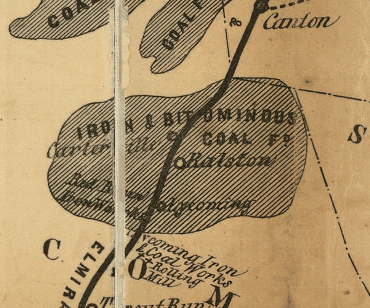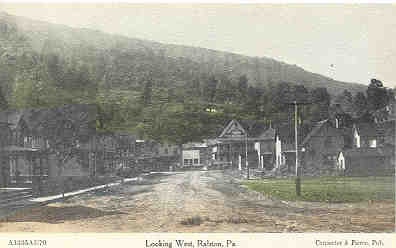is located on Lycoming Creek, 25 miles north of Williamsport.
Beginning in 1828, coal and iron were mined there.

Here Ralston
is shown situated in the center of iron and coal fields
in an early map
of the Williamsport & Elmira Railroad.
Ralston was named for
Matthew C. Ralston, of Philadelphia,
who was the original
president of the railroad
that was built from Williamsport
to Ralston between 1834 and 1837.
(By the time Ralston was reached, requiring fourteen bridges over the serpentine Lycoming, the money was exhausted and building ceased for nearly twenty years).
The project was, in the
1850's, continued through to Elmira, New York,
and it came to be known
as the Williamsport & Elmira Railroad.

The Ralston train
station c. 1900.
In 1876, Ralston consisted
of about twelve or fifteen houses,
one store, two hotels,
and a post-office.
In 1892, it was written
that, "Ralston never fulfilled the rosy expectations
of its founders. When
the railroad was completed through to Elmira,
and the McIntyre Coal
Company ceased operations, it came to a standstill almost,
and its growth for several
years past has been slow.
Its leading industry
now is the great tannery of J. E. Proctor,
which gives employment
to about 250 men…
At present Ralston has
about 106 families, with a population of 500…
J. W. Kilbourn runs a
general store".

A bird's eye view of
Ralston, c. 1920.

A view of the
village of Ralston, looking west, c. 1920.
By 1907 all the timber
had been taken from the mountains.
Mining had revived somewhat
but, in 1906 and 1907,
there were strikes in
the mines for higher wages.
By the time they were
settled, the coal company had lost
its best customer, the
railroad, thus making it difficult
to operate at a profit,
so mining was finally discontinued.
The tannery was the remaining employer, as was the railroad passing through.
The tannery burned c. 1926.
The railroad ceased to run c. 1954.
Ralston would grow no
more.